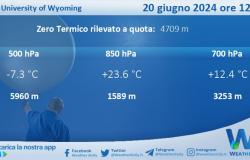Fields flooded in Massafra due to a leak in the Paoloni pipeline, just when water is scarce, Basilicata has closed the taps and the crops from Ginosa to Massafra passing through Palagiano, Palagianello and Castellaneta are dry, while the stables in Laterza are not they have water due to a temporary interruption in the supply of the rural aqueduct. The news was given by Coldiretti Puglia, with farmers exasperated by the flooded olive groves in Contrada Patemisco in Massafra due to the rupture of a pipeline with an enormous waste of water resources.
«In Puglia, 1 out of 2 liters of water is lost due to sieve nets, a waste that cannot be afforded. It is a disaster”thundered the president of Coldiretti Puglia, Alfonso Cavallo, with respect to the paradoxical scenario that the province of Taranto is experiencing, which «With the fields dry and the animals exhausted, we certainly cannot afford to waste water of this size. The failed management of water and reclamation in Puglia is evident, starting from the lack of ordinary and extraordinary maintenance for which in any case our farmers are sent crazy bills and the same goes for the irrigation works of which many are incomplete, often in precarious state, with losses that are no longer sustainable and even the reservoirs created need to be redeveloped, expanded and made suitable for modern distribution across the regional area”concludes Cavallo.
Over time, new and inevitable needs for extraordinary ordinary maintenance of public reclamation works have consolidated which cannot and must not be passed on to users who have, despite themselves, suffered innumerable damages due to lack of maintenance. The tropicalization of the climate now cyclically subjects Puglia, Coldiretti insists, to the violence of storms and water bombs that hit a fragile territory, where neglect and the lack of ordinary maintenance works on the canals and drainage networks aggravate the situation. A multi-year organic plan is needed for extraordinary maintenance interventions, in order not to burden the consortium members with improper burdens, already affected both financially and in the formation of income, in consideration of the repeated damage suffered due to the lack of maintenance of the reclamation structures and which makes investments in irrigation infrastructure and, above all, actively initiates extraordinary maintenance interventions on collective irrigation systems, including wells and drinking water distribution networks in rural areas.
Coldiretti Puglia deems the timetable of the interventions urgent, starting from the conclusion of the process of the General Reclamation Plan with the consequent implementation of the new Classification Plans, with divisions of the burdens adequately distributed throughout the territory and a wider audience of taxpayers, with a coherent application of the reclamation taxes connected to the benefits that the reclamation works bring to taxpayers’ properties, and that the region ensures their correct attribution, the overcoming of the debt burden on the commissionerate consortium system and the resolution of existing administrative and financial problems, the resumption of reclamation services (works, investments) in order to materialize and justify the payment of reclamation charges, the updating of the classification and taxes for agricultural businesses present in the areas affected by Xylella, in which a permanent calamity which has upset the structures of agricultural productivity, the completion of unfinished works and the resumption of hydraulic and irrigation projects to secure our territory for the near future, as well as further works for the supply of water for irrigation use.
With drought and rising sea levels, the rising salt wedge makes water resources and land unusable with a scenario that And more than worrying for the agricultural economy of the entire region. Among other things, Puglia is the region of Italy where it rains the least with an average of 641.5 millimeters per year and serious impacts on agriculture caused by drought which destroys crops and encourages fires and represents the most significant disaster for fields and it also maintains the negative record of the average annual availability of resource per capita with only 1000 cubic metres, less than half of the national average annual availability per capita estimated at 2330 cubic metres. On the other hand, 89% of rainwater is lost every year, a waste that Puglia cannot afford considering that it does not have water and needs important works to redesign its water and hydrogeological structure and to guarantee not only the water supply for the population, but to ensure adequate irrigation bodies for agricultural, artisanal and industrial production.
Saturday 15 June 2024
© ALL RIGHTS RESERVED





